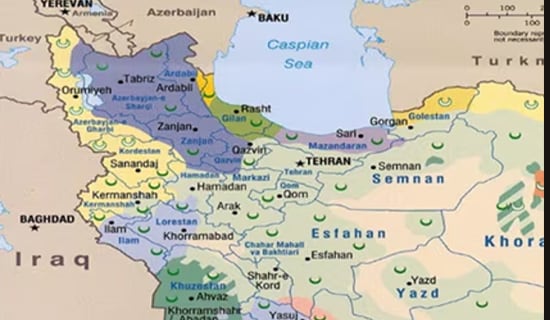Below is a translation of an article titled "Analysis: Four Things to Watch in 2023" by Chinese journalist Fang Ming. The article was originally published in Chinese on the Epoch Times website on January 24, 2023.[1]
"Analysis: Four Things to Watch in 2023" – Fang Ming, January 24, 2023
Things Are Not Going Well For The CCP
"A recent article by Wang Dan, a well-known pro-democracy activist, listed China's economy, politics, COVID epidemic and the situation across the Taiwan Straits as important things to observe in 2023. Wang He, an expert on China issues, analyzed and commented on this article, saying that the biggest variable in China in 2023 is the COVID epidemic. Wang He added that there is now a rare double crisis: Xi Jinping's personal governance crisis and the Communist Party's governance crisis – very dangerous for both, which are already intertwined."

Patient beds in a hospital lobby, China, January 10, 2023. (Kevin Frayer/Getty Images)
China's Economy Will Still Be In Trouble In 2023
"Wang Dan's article 'The Most Important Things to Watch in 2023,' published by RFA on January 23, pointed out that today's China has entered a period of high uncertainty, where anything may or may not happen, and that the probability of unexpected events will be greater than in the past. He believes that in 2023, four aspects of China need to be observed: economy, politics, the COVID pandemic, and the situation across the Taiwan Straits.
"In terms of China's economy, Wang Dan believes that the most important reason why Xi Jinping and the CCP suddenly and completely released control of the COVID epidemic late last year was that the dynamic zero-COVID policy had greatly damaged China's economic production. Now that China's COVID quarantine measures have been lifted, much of the Party's fate depends on whether the country's economy will be able to recover in 2023.
"China expert Wang He told Epoch Times on January 24 that in 2022, China's economy was already on shaky ground. Its growth could only rely on import and export trade, [and this trade] was good in the first half of the year, but significantly deteriorated in the second half. The impact of the Chinese government's massive investment in infrastructure construction... is limited, and domestic demand still cannot be boosted. In the last two months of last year, China's total retail sales of consumer goods continued to decline, and the Chinese economy is expected to be even worse in 2023. 'The consensus now,' he wrote, 'is that it will continue to shrink in 2023. My view is, it's going to be messy.'
"Meanwhile, in the fourth quarter of 2022, the total value of China's imports and exports of goods with the U.S. fell for three consecutive months on a year-on-year basis.
"Chinese people's lives have returned to normal after the lifting of COVID prevention and control restrictions, and China's economic growth is expected to return to pre-pandemic levels in 2023, according to Chinese Vice Premier Liu He, [who said this] at the annual meeting of the World Economic Forum on January 17.
"But Bradley Thayer, director of China policy at the Washington, D.C.-based Center for Security Policy think tank, wrote in The Hill on January 21 that Mr. Liu's 'every word was a lie.' Thayer wrote: 'In reality, China's economy is in the tank because of anemic economic growth – about 3 percent – due to profound structural problems in the economy, demographic decline, a property downturn, U.S. pressure on its tech sector, investors concerned about Chinese Communist Party (CCP) influence, and the viability of alternatives such as India, Indonesia and Vietnam. The most significant cause of its downturn has been the COVID-19 pandemic and the end of its 'zero-COVID' policy that is permitting the virus to spread among the population.'
"Thirty-one Chinese provinces, autonomous regions, and municipalities have recently announced their economic growth targets for 2023, with more than half of them setting annual GDP growth targets exceeding 5.5 percent.
"Wang He said that the CCP's economic growth target was designed to meet its political needs as it sought to achieve goals set out in its 14th Five-Year Plan and Long-Range Objectives for 2035. But judging from the current state of China's economy, these goals are simply impossible to achieve.
"'Cold eye on Finance and Economics (Leng Yan Cai Jing, 冷眼财经),' a we-media personality, also told Epoch Times, on January 19, that 'the political environment in China is becoming more and more stringent,' [and that] coupled with Xi's crackdown on private enterprises, foreign investors are voting with their feet. On the one hand, they say that China will get better and better after the COVID-19 pandemic control is lifted, and they are optimistic about the Chinese market – but on the other hand, they are pulling out of China very quickly, and last year they pulled out the quickest.
"Taiwan's Central News Agency quoted an insider as saying on January 22 that Chinese people are speeding up their departure from China as long as they have some money. The biggest reason for this is that Xi has [not only] won re-election, [he has also] brought with him to the top leadership a large number of his cronies."
The Emergence of the Xi Jinping/CCP Double Governance Crisis
"In March 2023, the CCP will hold its 'Two Sessions' – the yearly plenary meetings of the National People's Congress (NPC) and the Chinese People's Political Consultative Conference (CPPCC). Xi Jinping was re-elected in the CCP's 20th National Congress, and all of Xi's close allies have entered the Party's top leadership. But the power drama will not be finalized until the conclusion of the 'Two Sessions' in March, when Xi is re-elected as China's President and his hand-picked government team is installed.
"Wang Dan believes that although the NPC and CPPCC are rubber stamps, and the personnel arrangement of the new national leadership must have been decided, the personnel arrangement of the 'Two Sessions' is still worth paying attention to. Xi Jinping let the people who are most loyal to him occupy the various organs of power of the Party and the state, but the so-called 'loyalty' is actually superficial. Whether the power pattern of Xi is stable needs to be examined.
"Wang He called the annual 'Two Sessions' an open political show for the Communist Party, just in order to go through the motions. With the re-election of Xi as China's president, his power will be at its peak, and there is little chance of his removal through infighting. But there is another great contrast, which is that although Xi's power is at the peak, his political authority is at the nadir.
"Wang He said that the current social crisis in China has, unusually, evolved into a double crisis: One is Xi's personal governance crisis, and the other is a crisis of governance for the entire Communist Party.
"According to Wang He's analysis, 'in the past, if only one leader of the Communist Party failed, another leader would be replaced. But now the Communist Party itself is in crisis, and you can't change the leader because Xi is now tied to the Communist Party. So the situation is very dangerous. If the situation explodes, not only will Xi fall, but the CCP will fall with him.'"
The Taiwan Issue Is Highly Uncertain
"The Taiwan issue continues to be on the radar of both analysts.
"According to Wang Dan, 2023 is Taiwan's presidential election year, and the result of the election will not be known until 2024. This will have a great impact on Cross-Strait relations and the CCP's short-term policy on the Cross-Strait issue. Taiwan is the most important issue in Sino-U.S. relations, and the contest between the two powers in 2023 will be more likely to play out over Taiwan.
"Wang He said that Taiwan has actually entered a quasi-wartime state, and the National Defense Authorization Act signed by President Biden at the end of last year marked a very significant shift in U.S. military policy. The risk of a Communist attack on Taiwan is very high, but it is indeed still highly uncertain.
"On December 23, 2022, U.S. President Joe Biden signed into law the National Defense Authorization Act (NDAA). The Taiwan Enhanced Resilience Act (TERA), which is included in the law, will set out specific defense modernization plans for Taiwan. If the U.S. Secretary of State confirms that Taiwan is increasing its own defense budget, the U.S. government will be authorized to provide Taiwan with up to U.S. $2 billion in annual military financial assistance from 2023 to 2027, for a total of U.S. $10 billion over five years."
The Biggest Variable For China In 2023 Is The COVID Pandemic
"With regard to the COVID pandemic in China, Wang Dan pointed out that 'although the pandemic is over,' various social problems that have accumulated over the past three years, including widespread discontent among all social strata, will gradually come to light after the lifting of COVID-19 control measures. It is also worth watching whether the discontent against Xi Jinping will increase further within the Communist Party and Chinese society.
"According to Wang He, Wang Dan may have missed the biggest problem, which is that the direction of the COVID pandemic is the biggest destabilizing factor in China. China now presents a bipolar situation of 'fire and ice.' On the surface, officially, the peak of the pandemic has passed, and now many people are out on the streets, many are traveling abroad, as if the entire society is recovering. But at the same time, the death rate is very high; so many people are dying that crematoria are overwhelmed. Facilities such as cremation furnaces are being urgently purchased in many parts of the country.
"Wang He said: 'The death of a large number of people has had a huge impact on China's economy, politics and society. In particular, the truth about the death toll caused by the COVID pandemic in China has been exposed by overseas media.'
"After the CCP regime abandoned its 'dynamic zero-COVID' policy on December 7, 2022, the number of COVID-19 cases, severe cases, and deaths in China surged all at once. From major cities such as Beijing and Shanghai to second- and third-tier cities, a large number of elderly people have died of chronic diseases after contracting COVID. Hospitals are full of patients, and long lines have formed outside crematoriums.
"But since early December of last year, the CCP's official death toll has continued to be in the single digits or even zero per day, until [its publication] was finally stopped on Jan. 7, 2023. As a result, the total [official] number of deaths during that time period was less than 40. Foreign media reports, including by Reuters and Epoch Times, have revealed that the CCP authorities have ordered hospitals, in secret and verbal orders, not to list the cause of death as related to COVID-19.
"It was only under international pressure that the Communist Party authorities reported for the first time, on January 14, that 59,938 people with COVID-19 had died after being hospitalized – but this figure was still considered a serious underestimate. Even with the 12,658 new cases reported recently, the [official] total number of deaths from December 8, 2022 to January 19 of this year is still only 72,596, which is hard to believe.
"During the Chinese New Year, Chinese people who could not go home for the holiday due to the three-year zero-COVID policy are returning home on a large scale, bringing the COVID-19 pandemic from the cities to the remote rural areas. The British journal The Economist warned again, on January 19, that the virus had spread across much of China and that a second wave could be even deadlier.
"Leen Vervaeke, China correspondent for the Dutch newspaper de Volkskrant, recently stayed in Shitouzui, a remote mountainous town in Hubei province, from late December to early January, and found there a 'quiet wave of deaths' that was several times higher than usual. The local Communist Party secretary said that 80 percent of villagers were infected.
"The CCP has already placed a gag order on the rural pandemic. On January 18, the Cyberspace Administration of the CCP Central Committee ordered strict control over issues such as 'false information' and 'playing up the dark side of society' by publishing 'notes and observations on returning home.'
"Wang He said: 'The biggest variable for China in 2023 is the COVID-19 pandemic. If the epidemic develops further, the whole of China will be in a serious crisis. This is a mass death event that has never been seen before in human history, and the impact is difficult to assess.'"
[1] Epochtimes.com/gb/23/1/24/n13914609.htm, January 24, 2023.








